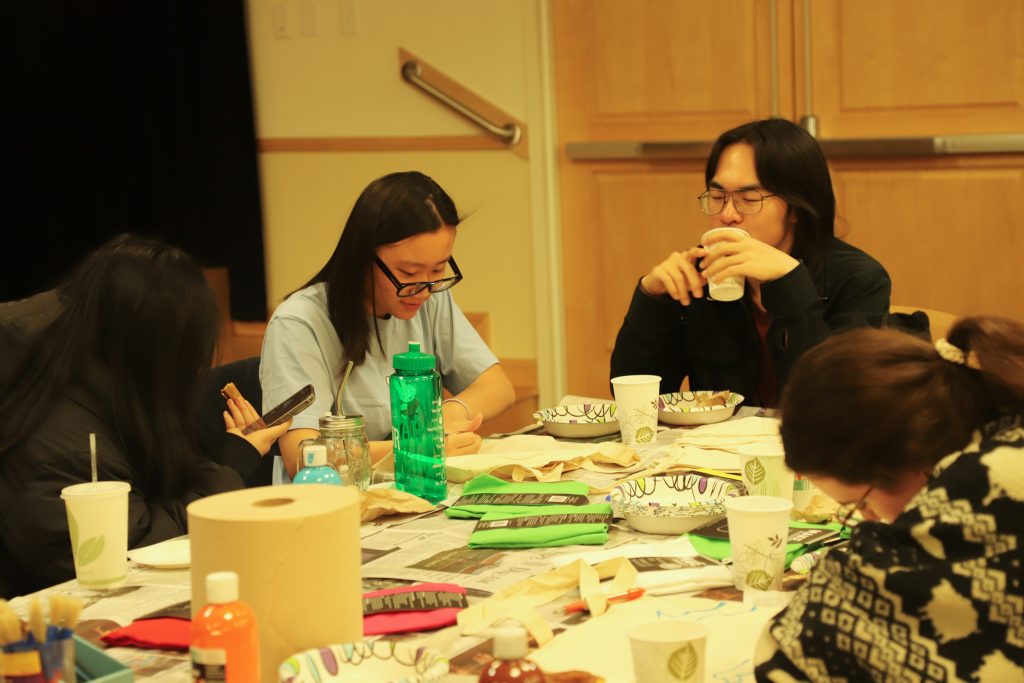A night of eco-friendly arts and crafts, food and education was held Thursday at Dickinson Community’s Sustainability Fest.
The festival, held in the Chenango Champlain Collegiate Center (C4) Multipurpose Room, included several events encouraging sustainable living. Organized by the Dickinson Community Assistants (CAs), the event included crafts, catering, a food drive and a Hydro Flask giveaway. Several campus and student organizations, including the Sustainability Hub and the Binghamton University Food Co-Op, tabled.
According to Makaela Volna, a CA and a marketing assistant in Dickinson and a junior majoring in sociology, Sustainability Fest was inspired by this year’s Common Read, titled “All We Can Save: Truth, Courage and Solutions for the Climate Crisis” — an anthology of essays, poetry and art by Ayana Elizabeth Johnson and Katharine Wilkinson. The work focuses on steps people can take to combat the ongoing climate crisis.
“Sarah Bull is Dickinson’s faculty-in-residence and works directly with the Common Read every year,” Volna wrote in an email. “After hearing that this year’s reading centered around sustainability, we were hoping to collaborate with her, thus Sustainability Fest was created.”
Six Dickinson CAs worked together to organize the event. Throughout three meetings, they decided on the activities, materials and location and partnered with several campus organizations, including the University’s Food Pantry, the Science Library’s Sustainability Hub and the Dickinson Town Council. Zero Hour Binghamton, a student environmental justice organization, worked closely with the Dickinson CAs to organize the Sustainability Fest.
Attendees painted tote bags and glass mugs and decorated reusable water bottles with stickers. At another table, posters for each Dickinson residence hall were decorated with plastic bottle caps that attendees painted various colors. For the Hydro Flask giveaway, attendees donated an article of clothing or a nonperishable food item to enter the lottery. All food collected was donated to the Food Pantry.
“Our main goals for [the] Sustainability Fest were to fuse sustainability and exciting activities,” Volna wrote. “Overall, we are striving for a fun, informative and sustainable event!”
The Sustainability Hub, a space dedicated to encouraging sustainability through events, research and compiling resources, and the Seed Library set up a planting station where people made pots from recycled paper and planted seeds. The Seed Library, located in the Science Library, allows students to borrow and later harvest and return seeds to promote biodiversity and sustainability.
Jacqueline Jergenson, a student assistant at the Seed Library and a first-year graduate student majoring in sustainable communities, said that she hoped the event would introduce students to campus-wide sustainability efforts.
“I definitely hope people get more excited about the Seed Library,” Jergenson said. “You can stop by anytime — we have this cute little thing of drawers where anyone can come by, pick out seeds and just take them. I hope people stop by there or get involved with any of the sustainability clubs. They all do a lot of cool different things.”
Villaire Jackson, a sophomore majoring in mathematical sciences, said she enjoyed attending Sustainability Fest.
“I thought the event was really well done,” Jackson wrote in an email. “It was extremely organized with the different tables for activities and the different clubs. I enjoyed the tote bag painting and being able to collect stickers along with other things. There was nothing that I did not enjoy.”



